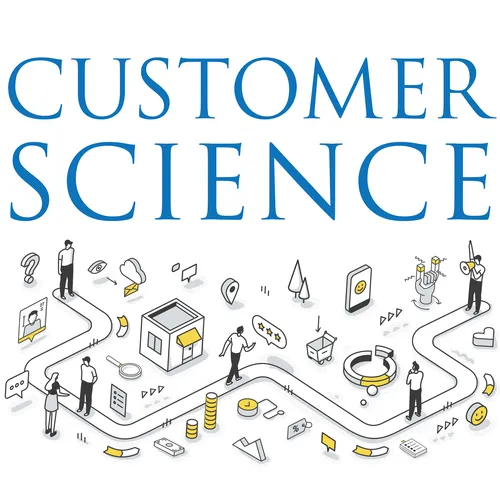
Customer Science
This podcast is based on The Customer Science Handbook by Alexander Chernev, professor of marketing at the Kellogg School of Management at Northwestern University. Drawing on decades of research in psychology, behavioral economics, and marketing, it examines the forces that shape customer behavior and offers a systematic approach to creating transformative customer experiences.
- Update frequency
- every day
- Average duration
- 22 minutes
- Episodes
- 46
- Years Active
- 2025

Choice Based on Reasons
This episode explores how people often make choices not just based on preferences but also to justify those choices with reasons. It illustrates how providing reasons can change what people choose, e…

Conducting Descriptive Research
Descriptive research allows companies to analyze large volumes of structured and unstructured data to understand market conditions, customer segments, and behavioral trends. This episode discusses ho…

Dimensions of Customer Value
Customer value is multi-dimensional, encompassing functional, psychological, and monetary aspects that interact to shape the customer experience. This episode highlights how companies like Tesla and …

Thinking in Categories
People often evaluate products qualitatively by sorting them into categories, leading to mental shortcuts and biases such as stereotyping and unit bias. The episode explores how categorization influe…

Fostering Emotional Engagement
This episode focuses on how emotional involvement enhances the customer experience and increases satisfaction, loyalty, and brand resonance. It explores the psychological mechanisms behind emotional …

Functional Loyalty
This episode explores functional loyalty, which is driven by customers’ satisfaction with the tangible benefits of a company’s offering. It highlights the role of performance consistency, reliability…

Emotional Loyalty
Focusing on emotional loyalty, this episode explains how customers’ feelings—especially enjoyment and emotional reinforcement—can drive lasting brand connections. It showcases the success of campaign…

Defining the Business Problem and Formulating the Research Question
Framing the right business problem is a critical first step in any successful research effort. This episode discusses how to translate vague business challenges into clear, researchable questions tha…

Interpreting the Research Findings and Solving the Business Problem
After collecting and analyzing data, the real challenge lies in interpreting results accurately and linking them to business decisions. This episode explores common validity threats, decision errors,…

Understanding Customer Value
This episode explores how customer value is defined not by the attributes of a product but by the benefits and costs as perceived by customers. It emphasizes the importance of aligning offering attri…

Implementational Barriers to Action
Implementational barriers arise when customers struggle to turn their decisions into action due to unclear steps or high perceived effort. The episode covers two key obstacles—implementation uncertai…

Managing Consumption
Consumption experiences don’t just happen—they can be designed, managed, and enhanced. This episode explores how structuring consumption, such as pacing and sequencing experiences, can boost customer…

Creating Memories
Memories of experiences—not just the experiences themselves—play a critical role in shaping future customer decisions. This episode introduces the “peak–end rule,” emphasizing how the most intense an…

Market Research as a Source of Customer Insights
This episode explores the role of market research in uncovering customer insights that drive strategic business decisions. It highlights how understanding customer motivations, preferences, and behav…

Designing Exploratory Studies
Exploratory research helps managers uncover insights into customer needs and behaviors when little is known about the problem space. This episode explains how techniques like focus groups, ethnograph…

Emotional Triggers
This episode explores how brands use emotional triggers to tap into consumers' desire for pleasure, excitement, and security—or to provoke fear and anxiety to drive action. Positive triggers such as …

Identity Triggers
Identity triggers focus on consumers’ need for self-expression, status, and personal values, making them the most personally relevant of all triggers. This episode explores status-based triggers like…

Focus, Primacy, and Fluency
This episode examines how what we focus on shapes our perceptions of importance, attractiveness, and truth. It covers the focusing illusion, primacy effects, and processing fluency, showing how even …

Drawing Attention
The episode discusses how attention—our selective gateway to perception—determines which information is processed and remembered. It breaks down the physical and psychological triggers that attract a…

Managing Customer Involvement
The episode outlines the “involvement gap” between highly engaged managers and largely indifferent consumers, who make most decisions using quick, intuitive thinking. It emphasizes the importance of …